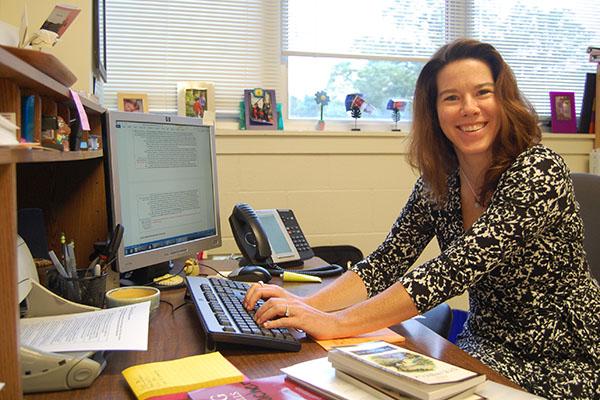Changing the name, but not the responsibility
As the school year begins, the Instructional Coaches start in their new roles

Sarah Johnson, the English and Library Instructional Coach
September 16, 2014
Last year, the role of department chairs was changed. Instead of being known as department chairs who controlled one department, a different role, now called instructional coaches, was created.
“The department chair model has been in place for quite some and the last contract that included the department chairs was a five year agreement,” Superintendent Kevin Skinkis said.
With the change in the contract, which was enacted July 2014, the roles of the instructional coaches and the look of some of the departments changed. Various departments, including Wellness, World Language, Library, English, Applied Arts, and Fine Arts were combined. Spanish teacher Jenna Osburn became the Wellness and World Language instructional coach and is optimistic about the change.
“Teachers embrace the change and hopefully in those combined departments, everybody can continue to learn from each other as well as the departments that haven’t been combined,” Osburn said. “That’s always a strength of ours… we try to learn from each other and play off each other’s strengths.”
The new contract also included a different model for teacher evaluation called the Danielson Model. Now, instead of the department chairs or the instructional coaches evaluating teachers, the administration is conducting the evaluations. The role of the instructional coach in that process is being a mentor and supporter rather than an evaluator.
“At the end of the day, all parties agreed that it would be best if administrators, non-union members, were evaluating staff,” Skinkis said, “So, that changed a big portion of the roles of department chairs which led us to develop a new model where they [the instructional coaches] now focus more on just maintaining department responsibilities and supporting and coaching teachers, data analysis, and delivery, and instruction, and actually working more with the teachers to support them to do a good job on those evaluations.”
English teacher and the English and Library instructional coach Sarah Johnson has embraced her new role as being a leader in a position she has learned a lot about recently.
“I am struggling time wise to get everything done, but with that said, I think there is enormous potential in our library,” Johnson said. “I enjoy working with our librarians and the support staff in the library and so I feel hopeful, even if I am strapped for time, that we can do some exciting things.”
In addition to the change of the instructional coaches, Kristin Smetana became interim principal with former Principal Pam Bylsma’s departure for Hinsdale. In her new role, Smetana created new building goals she hopes the instructional coaches will help their departments complete.
“The building goal this year is to actively engage students through formative assessment, technology, and attendance,” Smetana said. “And so, the instructional coaches are working with their departments in the different types of formative assessment that they are using in their classroom as a way to leverage those in a way actively engage students so students aren’t just in class taking notes but that they are actively partaking in their learning.”
Formative assessment is a new approach for teachers to see how each student is doing in their various subjects.
“In the building, our principal [Kristin] Smetana and our assistant principal [Kimberly] Hayes made a focus on something called formative assessment,” Johnson said. “Formative assessment is when you do mini checks…think the Math approach in English. It’s a little wacky for us.”
Formative assessment is only a small part of what the instructional coaches have to do to help their departments. The role of the instructional coaches includes being helpful in their individual departments and helping the teachers be the most informed.
“As a superintendent, what I would like to see from the instructional coaches is a level of intervention that teachers can rely on to help them become better teachers, to answer questions or to get resources to continue to grow in the classroom,” Skinkis said.
Osburn added, “As an instructional coach, I have to communicate information from the administration to teachers. I also have to help teachers in developing curriculum within each department.”
The new contract including the new position of instructional coaches is only a two year contract with time to decide if anything needs to change or if things can stay the same.
“I’m optimistic for the two years that we can make it work and everybody involved is a really good team and if anything arises, I think we can work through them,” Skinkis said.
“Change can always be difficult and there will be issues that we’ll have to work through together,” Smetana said.


